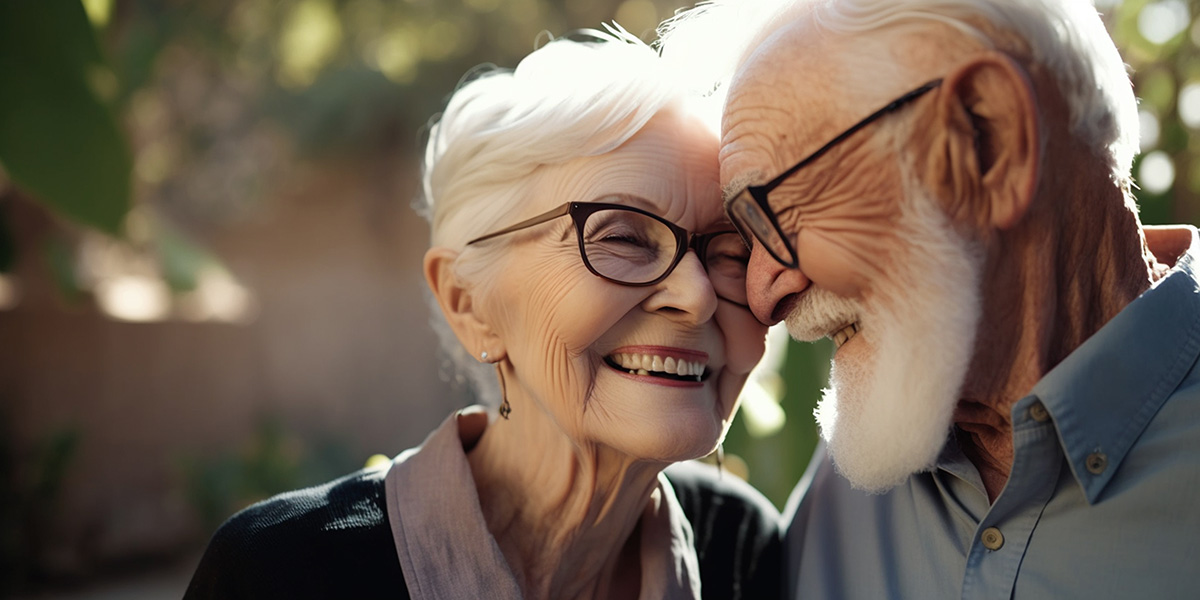How Music Can Help Those Who Are Living with Dementia

- Music therapy for dementia
- What are the benefits of music for those who are living with dementia?
- 1. Mental health
- 2. Communication and self-expression
- 3. Care
- 4. Community and sharing
- What kind of music works best?
- What is music therapy and how can it help someone with dementia?
- Do you have to be trained in music to use music as a caregiver?
Music therapy for dementia
We all have a connection to music. We feel something when that song comes on, whatever that song is for you. Maybe it’s the song you and your partner danced to for the first time. Maybe it’s a song your mother sang to you growing up. Maybe it’s the first song you learned to play on the piano. Music is powerful because it is so strongly connected to our memories. Songs can transport us to another time, feeling or moment that was significant to us. This is why music can be so beneficial for someone who is living with a neurodegenerative condition like dementia.
While those who are living with dementia may not be able to access their short-term memories, numerous examples and case studies show that they can recognize a song from their distant past. They may even remember all the words, dance moves, or the person they shared that moment with.
Grace Meadows, a music therapist and the director of Music for Dementia, explains why.
“We process music across our entire brain,” she says. This means that even though parts of the brain are no longer properly functioning in those who are living with dementia, they can still access music with the parts of the brain that are intact. Because of this, music has a unique and profound effect on those living with cognitive decline.

What are the benefits of music for those who are living with dementia?
Studies show that music can help slow the progression of dementia. It can improve communication skills and decrease caregiver stress, and it can improve the quality of life for those living with dementia.
Music for Dementia, a UK-based organization, claims music has four primary benefits for those who are living with dementia.
1. Mental health
As Meadows told the Dementia Untangled podcast, “Music is our emotions in sound…it can meet us where we’re at.” She went on to explain that music can help us process our emotions and even “recycle” them into something more useful, positive or helpful.
Those who are living with dementia often struggle with their mental health as the diagnosis, as well as the symptoms, are difficult to deal with. Many struggle with depression and anxiety as a result. Music can be used to help process and manage these mental health conditions, which if left untreated, can make dementia symptoms worse.
2. Communication and self-expression
“When verbal capacity to communicate declines, we need alternative ways to communicate because we’re social creatures,” says Meadows. This is where music comes in. It can help us “express the uncommunicable.”
How often has a song put words to your emotions or helped you articulate something you didn’t know how to? In the same way, music can help someone who has lost his ability to speak communicate effectively, feel heard, seen and understood.
Music can help someone express herself who may feel like she’s lost who she is or is no longer able to communicate this to others. She can do so by singing, playing an instrument or playing certain songs from a playlist, restoring her sense of self and self-expression.
3. Care
“Music enhances and enriches quality of care for those with dementia,” Meadows explains.
A caregiver can learn a lot about someone through what Meadows calls “their musical personality.” Caregivers can then tailor that person’s daily care accordingly, playing songs he likes, songs that calm him, and songs that make him feel happy.
While amnesia is caused by a specific event—head trauma, for example—dementia is not caused by a sudden onset event. It is a progressive disease that worsens over time. While head injury can make someone more susceptible to developing dementia in the future, the actual cause of dementia is more complicated.
4. Community and sharing
Music provides a natural environment to help those who are living with dementia connect to others and feel a part of a community. Choirs, concerts and simply listening to the radio can all be social events that encourage connection and activity, which can be hard to come by for those who are living with dementia.
What kind of music works best?
When it comes to the type of music that is most beneficial, that depends on the individual. What kind of music does he like? What makes him feel happy, calm or reminiscent?
Dr. Bethany Cook, a clinical psychologist and music therapist, told Medical News Today that the best music to use is the music someone loved from the age of seven into their mid-twenties.
As she explains, “These foundational memories and songs are locked together in deeper vaults down windy mountain roads that dementia doesn’t seem to be able to fully crush. I’ve seen a person not recognize their spouse of 65 years but when I play their wedding song this individual turns to their spouse and they recognize them and dance.”
You also don’t want to play music that seems to aggravate someone with dementia, making her angry or hostile. This will vary depending on the person, so getting to know the person and her musical history and preferences is key.
What is music therapy and how can it help someone with dementia?
According to the American Music Therapy Association, Music therapy is “the clinical and evidence-based use of music interventions to accomplish individualized goals within a therapeutic relationship by a credentialed professional who has completed an approved music therapy program.”
A music therapist understands the neurological, psychiatric and psychological implications of dementia, so he or she will be able to tailor music interventions to an individual’s cognitive and emotional needs. Music therapists don’t simply play music for their clients; they will develop a strategy of care that involves music that will allow their clients to process difficult emotions, help their communication skills and improve their quality of life while living with dementia.
Music therapy would be helpful for anyone with dementia who is struggling to communicate, struggling with their mental health or who seems disengaged from society and their environment.
Do you have to be trained in music to use music as a caregiver?
While Meadows herself is a trained musician, she is adamant that you do not have to be trained in music to use music as a part of your caregiving strategy. Anyone can create a playlist, hit play on the radio or sing.
Once you know someone’s musical history, personality and preferences, you can play songs throughout the day, helping the person you’re caring for feel more calm and at ease and helping you feel more connected as a caregiver.





